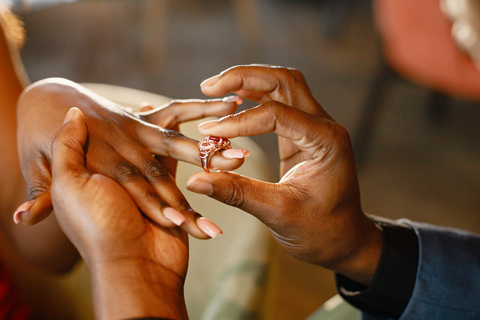Can I keep the engagement ring after separation or divorce?

This seems like a simple question, but the answer is far from simple. Who keeps the engagement ring after separation or divorce will depend on your individual circumstances. The issue of who keeps the ring is a question frequently asked of family lawyers.
This blog will explore what things to consider if you separate and want to retain your engagement rings.
Traditionally, Australian courts held the view that the person who gives an engagement ring in contemplation of marriage to another person is entitled to retain the ring in the event the marriage does not proceed. In modern society, however, many couples live together prior to their marriage (and sometimes for a considerable time), which further complicates the matter of who keeps the engagement ring after separation.
We need to consider the law with respect to engagement rings in the following contexts:
-
Traditional engagements – couples that become engaged but do not live together before marriage;
-
De facto couples – couples that live together and become engaged but do not marry;
-
Married couples – couples that get engaged, live together and then go on to marry.
Who keeps the engagement ring after a traditional engagement?
Traditional engagements are less common nowadays as many more couples are living together before they get married. If you and your former partner followed this path, ending an engagement can be seen as a breach of a promise to marry that person.
In these circumstances, the Courts have said that the ring is regarded as a ‘conditional gift’ given to someone with the expectation that they will get married. Therefore, the engagement ring should be returned to the person giving the ring unless there is a ‘legal justification’ not to do so.
The case of Papathanasopoulos v Vacopoulos [2007] NSWSC 502 sets out the factors a Court would consider if it were hearing engagement ring disputes in the context of traditional engagements.
-
If a person who receives a ring upon accepting someone’s marriage proposal refuses to go ahead with the marriage, they must return the ring.
-
If the person giving the ring refuses to go ahead with the marriage without legal justification, they cannot demand the return of the ring.
-
It doesn’t matter whether the marriage not going ahead turns out to be mutually beneficial for you and your former partner.
-
If the engagement is ended by mutual consent, the engagement ring should be returned unless an agreement has been reached between the parties to do something different.
-
‘Legal justification’ refers to any conduct of the ring giver that justifies the ring recipient keeping the engagement ring. If the ring giver engages in behaviour such as unlawful conduct, domestic and family violence, or infidelity, then the ring recipient may be able to keep the engagement ring.
Who keeps the engagement ring in de facto and marriage separations?
The Family Law Act (the Act) deems a de facto relationship to exist if two people are not legally married and are in a relationship as a couple, living together on a “genuine domestic basis”. This also includes couples who have a child together.
In Western Australia, a de facto relationship, by definition and reference to Section 13A (1) of the Interpretation Act 1984 (WA) (the Interpretation Act), is:
‘...a relationship (other than a legal marriage) between 2 persons who live together in a marriage-like relationship’.
You can read more about de facto relationships in the family law in our blog, “Are we just dating or are we in a de facto relationship”.
When married couples or de facto couples separate, the Act comes into action.
Engagement rings generally hold a great amount of emotional value and are mostly excluded from property settlement negotiations. However, if either party raised it in the negotiation process, the engagement ring may be classed as property and added to the total value of the asset pool to be divided between each party. This is particularly true when an engagement ring is of significant monetary value.
When making decisions around this, the Court will consider the following factors:
-
The monetary value of the engagement ring;
-
The total value of the property pool;
-
The length of the couple’s relationship;
-
The financial and non-financial contributions made by each party during the relationship; and
-
Each party’s individual future needs after separation.
The monetary value of the engagement ring for the purposes of a property settlement is the second-hand value, not the amount it was purchased for. This is a common misconception with many items that form part of the asset pool (e.g. cars, houses, etc). If the value cannot be agreed, then the ring will need to be externally valued by a professional licensed jewellery valuer.
Cases involving disputes about engagement rings
It is important to note that decisions surrounding the retention of engagement rings, as well as the inclusion into property settlement negotiations, will change on a case-by-case basis.
In the matter of Marsden & Baker [2013] FamCA 320, the husband purchased the engagement ring for $170,000. After the couple separated, the wife sought to retain the proceeds from the sale of the engagement ring, which was sold for $70,000. This was used to pay for her legal fees and her general living expenses at the time. The parties agreed that the proceeds of the sale would form part of the property pool.
In the case of Damiani & Damiani [2012] FamCA 535, the husband and wife were married for a period of 19 months. The engagement ring was valued at $15,000. The parties agreed that the wife would return the ring to the husband, and it would form part of his share of the asset pool. His Honour noted that the parties’ agreement was contrary to the normal practice of excluding engagement rings from the asset pool.
How can a family lawyer help?
The Court does not seem to have a fixed view on how to deal with issues surrounding engagement rings after separation or divorce. Rather, it promotes a case-by-case approach which takes into consideration every relationship’s individual circumstances.
It is incredibly important to speak with an experienced family lawyer if you are seeking to retain or have an engagement ring returned to you after separation. Our team are here to help.
Contacting Meillon & Bright
Family Lawyers Perth & Sydney
The information contained in this article is of general nature and should not be construed as legal advice. If you require further information, advice or assistance for your specific circumstances, please contact Meillon & Bright Family Lawyers.

